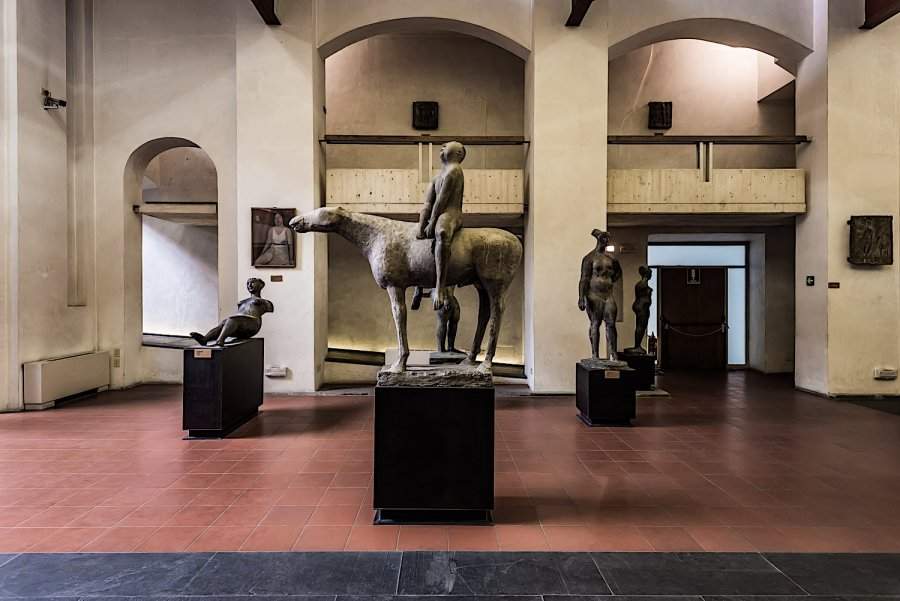Marino Marini's works remain in Pistoia for now: the Tar rules in favor of MiBACT
They will remain in Pistoia, at least for the time being, the works of Marino Marini (Pistoia, 1901 - Viareggio, 1980) housed at the museum dedicated to the artist located at Palazzo del Tau in the Tuscan city. As we had told you in the past months, the board of the Marino Marini Foundation intended to move them to the Marino Marini Museum in Florence. In fact, in Tuscany there are two museums dedicated to the work of the great sculptor: in Florence there are the works that the artist donated to the City of Florence, while in Pistoia those left to the latter city. The Foundation’s proposal had aroused great controversy and substantial opposition from the world of culture. Even the director of the Uffizi, Eike Schmidt, had called the idea of moving the works to Florence "an absurdity."
The affair then ended up in court: the Superintendency, in fact, had placed a territorial constraint on the works (a measure that sanctions the indissoluble link between works and territory), and against this measure the Foundation had appealed to the Tar of Tuscany, challenging the constraint placed by the Superintendency.
The reasons of the Tar
Thus, after a year, here is the verdict of the administrative court: the works remain in Pistoia, as the Tar ruled in favor of MiBACT (on which the superintendency depends), deeming the Foundation’s appeal unfounded. The court ruled that the ownership of the works is not relevant to their protection, that the constraint does not change the rights of the Foundation, that the alleged unsuitability of the location does not affect the possibility of affixing a constraint, and also remarked on the value of the link between the artist and the city. As a result, the ruling states, the Foundation’s reasons are “forced in a context that, both at the level of foundation acts and correspondence with the administrations involved, highlights on the contrary the strong will of the founder to develop in parallel the two initiatives (the museums in Pistoia and in Florence, ed.), moreover ensuring a role of supervision and control to the Pistoia structure.”
On the other hand, as for the decree with which the Archival Superintendence had notified the historic and artistic interest of the Marino Marini Foundation’sdocumentary archives, which was also challenged by the Foundation itself before the Regional Administrative Court, the court in this case upheld the formal issues raised by the Foundation, ordering the renewal of the procedure for the adoption of the decree by the Archival Superintendence. However, this is a formal issue and not one of merit, notes the City of Pistoia.
The satisfaction of the City of Pistoia
And in the halls of the municipality there is satisfaction. “A first important battle won by our city,” comments Mayor Alessandro Tomasi. “Pistoia and the Maestro are inextricably linked. We have supported him since the beginning of this affair. A year ago I was in Rome, at Minister Franceschini’s Chief of Staff, precisely to protect our cultural heritage and emphasize this deep bond between the Maestro and his, our, city.”
The City of Pistoia has for some time now been willing to take charge of the Marini Museum, through a free loan for use, in order to reopen it and return it to the city and visitors. “This Administration,” the mayor recalls, “is willing to put up the money for the guardianship, to take over the artistic direction of the Museum, and we have also already made ourselves available to carry out some improvements to the structure. We are also working on an enhancement of the Maestro’s work through the Strategic Plan for Culture. We have been waiting, for some time, for answers from the Foundation. It is clear that the municipality is creating all the conditions for the reopening, but without the agreement signed by the Foundation it is not possible to proceed. Now that the TAR has rejected the Foundation’s appeal, we hope there can be positive answers. We have established, I want to emphasize, the provincial museum system and soon I will call the President of the Region, Eugenio Giani, to continue the work undertaken through the protocol signed with the Region on the Marino Marini. We all have to work for the enhancement of the works.”
Of course, the Foundation may appeal to the Council of State, the highest level of administrative justice, but at least for now the people of Pistoia can rejoice.
Pictured: interior of the Marino Marini Museum in Pistoia.
 |
| Marino Marini's works remain in Pistoia for now: the Tar rules in favor of MiBACT |
Warning: the translation into English of the original Italian article was created using automatic tools. We undertake to review all articles, but we do not guarantee the total absence of inaccuracies in the translation due to the program. You can find the original by clicking on the ITA button. If you find any mistake,please contact us.




























